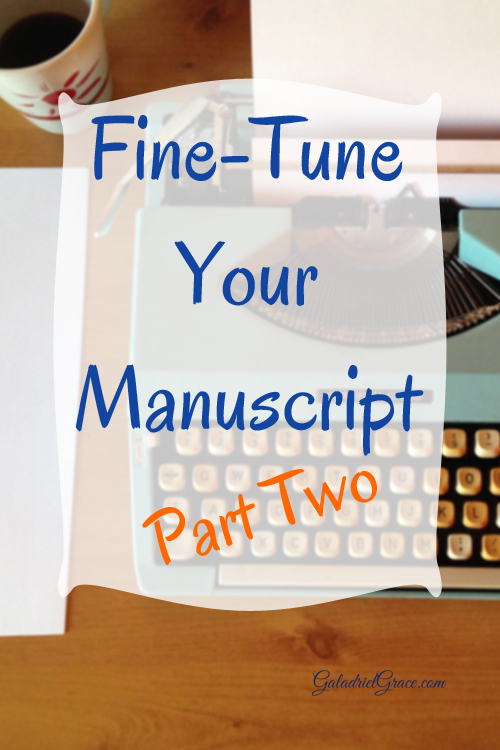The only just literary critic is Christ, who admires more than does any man, the gifts He Himself has bestowed. – JRR Tolkien
Fine Tuning Your Manuscript – Part Two
The Three S's - Scene, Setting, and Senses

Stories don’t occur in a bubble.
They have to be set in a real and believable place. And what makes a scene or setting, is detail.
And what makes the details, is work. Hard work. A lot of time and effort, in other words.
Settings aren’t just where the action occurs. Scenes and settings offer you another way to reveal your characters.
A character’s room or home can reveal certain traits like OCD or slovenliness.
You can write,
Jody was an anal-retentive bastard.
Or, you can write,
Every item in Jody’s pantry was fronted and faced like the shelves in a grocery store, listed in alphabetical order from left to right, on shelves clean enough to eat off of.
It’s not hard to discern which is better.
In addition, the wealth or poverty of your characters can be demonstrated by describing the homes or neighborhoods where they dwell. Because a book isn’t a play or a motion picture, it’s up to you as an author to construct and paint the props, to stitch and sew your character’s clothing, and to plant the trees and flowers that landscape your settings.
You don’t have to provide the genus or species of every plant, the name brand of every shirt or dress, or the dish served at every meal. Just enough to keep the reader firmly in place wherever you choose to situate them.
Science has only recently discovered that language is not only processed in areas of the brain dealing with hearing and speaking, but also in areas associated with seeing and movement.
In other words, when we hear words describing an action, such as tossing a frisbee, our brains simulate that action. So in a very real sense, a well-written story stimulates our brains to recreate that world and experience it inside ourselves.
Just think of it, from words typed on a piece of paper, we can create entire worlds in our readers’ minds and transport them from their mundane lives into whenever and wherever you choose to take them.
But to accomplish this, we must carefully choose the right words to evoke such experiences. Lets say you want to evoke in the readers’ mind memories of a childhood camping trip with your family.
Compare the following two passages:
- I used to love camping when I was a kid. I go back in time when I recall the fond memories of those wonderful times.
- There’s nothing better than awakening on a brisk clear morning in the middle of a pine forest, to the melodious chirping of birds, a crackling campfire, and the sound of bacon sizzling in a frying pan. I can still smell the cedar burning, the rich aroma of coffee, and even the musty old tent, as I crawled from it after a good night’s sleep. Believe me, nothing compares to the taste of a fresh breakfast cooked over an open campfire. When you step out into the bright, enchanting, green of the forest, reflecting in the brilliant morning sun, with the feeling of pine needles under your bare feet, you feel at one with the earth and all life.
Again, it’s not difficult to discern which passage better evokes the experience of camping.
If your smart, like me, you’ll pull out your thesaurus for scenes like this.
Wait, scratch that. If you’re smart, you won’t need a thesaurus.
So if you’re semi-literate, like me, you’ll wanna pull out your thesaurus.
You’re going to need words that evoke.
Words like brisk, brilliant, enchanting, musty, and crackling. Words that color and texture your scene.










Pingback: Simple Steps to Editing Success | Galadriel Grace
Pingback: Edit Your Book | Galadriel Grace